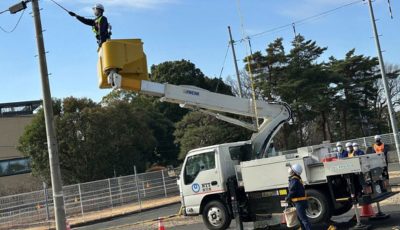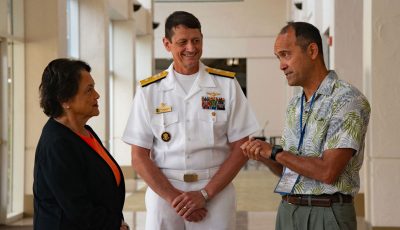DECOLONIZATION DEBATE REVEALS:
When informed, Guam residents choose independence
MANGILAO, Guam—At a decolonization debate held at Tiyan High School Friday, April 22 before an audience of 800, a team of high school students arguing in favor of independence successfully changed the most minds according to polls held before and after the debate.
The debate, organized by the Guam Department of Education and the Commission on Decolonization, featured student representatives from four high schools (Tiyan High School, George Washington High School, Southern High School and Southern Christian Academy). One student from each school was assigned as a representative on each political status option’s team. The teams were assisted by coaches from each of the official political status task forces, who prepared them to make informed arguments. The overall winning team of the debate was determined by two audience polls—one taken prior to the debate and the second taken after all the arguments had been presented. The team that had the largest positive increase in audience support between the two polls was declared the victor, as they had swayed the most minds.
The pre-debate polls revealed that prior to any education or discussion on the status options, 51 percent of the audience chose statehood, 30 percent chose free association, and 19 percent chose independence. After more than an hour of discussion, the post-debate poll showed the following changes: Statehood dipped 3 points to 48 percent, free association fell 12 points to 18 percent, and independence jumped 15 points to 34 percent, winning the debate.
Tiyan High School senior, Peter John Cruz, made the opening statement for the independence team and encouraged people not to be afraid of independence by stating: “The fear of independence is like fearing the monster under your bed. All the things like starvation, fall of infrastructure and disorder are figments of your imagination. Instead of using your imagination to think of monsters, use it to think of all the possibilities on the horizon of independence.”
Tadashi Hiura (GW) and Ai’sha De Leon Guerrero (Southern Christian) both outlined the possibilities for Guam as an independent country, and noted that rather than life in Guam falling into disarray, things could actually improve, as our government, economy, defense and educational systems would become more locally focused and would be designed to serve the island’s needs, rather than the needs of the United States.
In her passionate closing, Brey Rosario, a senior from Southern High School, argued that independence does not mean isolation or being cut-off: “Just because we obtain self-governance, it does not mean that we must completely sever ties with the United States. It just gives us the freedom to negotiate with other nations, to work with those around us and utilize for our own interests and for our people, our resources and our geographic location.”
Decolonization is an idea that is often difficult to discuss or imagine, as Guam has been a colony for several centuries. But in terms of moving ahead on political status, education equals empowerment. As the results of the debate show, when people are educated about the possibilities for our future, they are able to see past many of the misunderstandings about independence and are more inclined to choose self-governance.



























